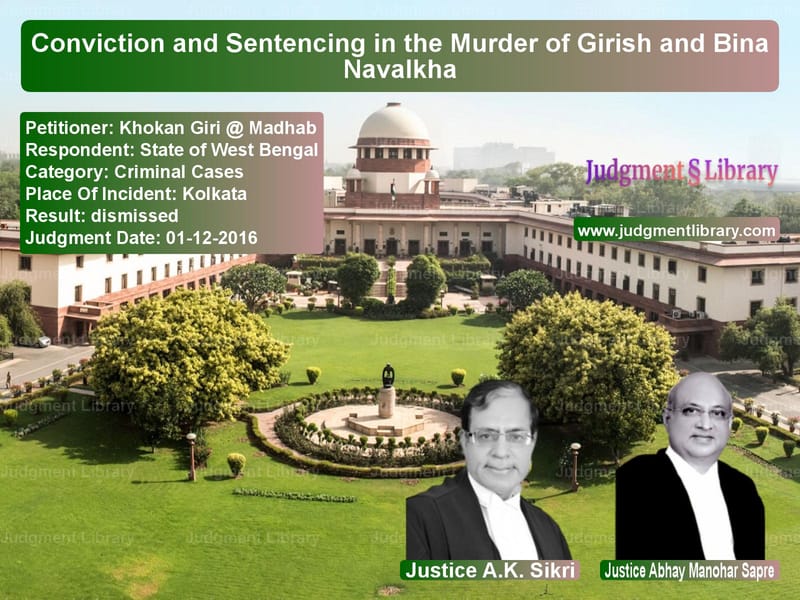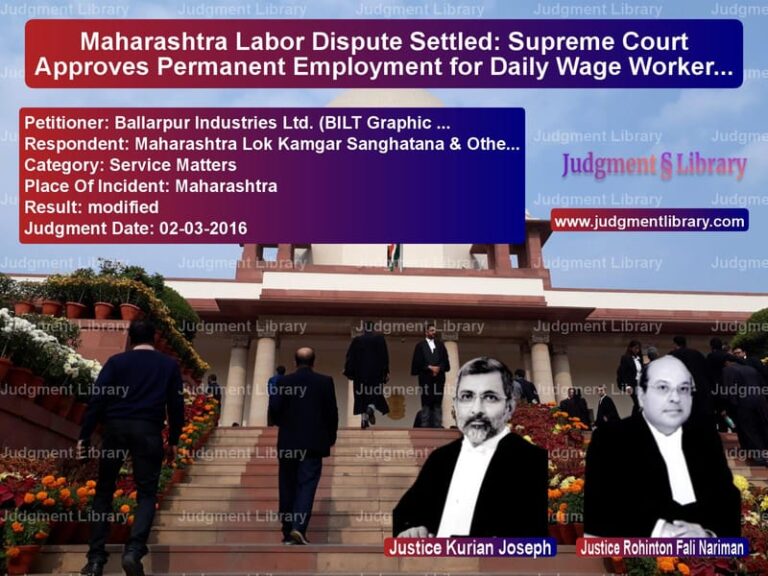Conviction and Sentencing in the Murder of Girish and Bina Navalkha
The case involves Khokan Giri, along with three other accused persons, who were convicted under various sections of the Indian Penal Code (IPC), including Sections 302 (murder), 34 (common intention), 120B (criminal conspiracy), and 394 (robbery). The crime in question was the brutal murder of an elderly couple, Girish Navalkha and Bina Navalkha, in their flat in Rameshwar Apartment, Kolkata. The appellants were sentenced to life imprisonment for the murder and additional terms for robbery.
Background of the Crime:
On 25th December 1991, a case was registered following the discovery of the bodies of Girish and Bina Navalkha by a family friend, Jugal Kishore Khetwat. Upon visiting their flat, Khetwat found Bina’s body tied to a ceiling fan with a sari, and Girish was found dead in his study room with a shawl around his neck. The apartment had been ransacked, leading to the suspicion of robbery.
Investigation and Arrest:
The investigation led to the arrest of Khokan Giri, who worked as a servant at Khetwat’s office, followed by the arrests of Raju Rao, Bimala Khetwat (the wife of Jugal Kishore Khetwat), Kamini Dey, and Jagadish Jadav. The prosecution presented evidence, including the recovery of stolen items from the arrested suspects, which tied them to the crime.
The central evidence came from Raju Rao, who, after his arrest, became an approver (a witness for the prosecution). He confessed that Bimala Khetwat had hired him and Khokan Giri to murder the Navalkha couple due to her jealousy and suspicion of an illicit relationship between her husband and Bina Navalkha. The motive for the murder was to eliminate the couple and gain financially from them.
Raju Rao’s Confession:
According to the confession made by Raju Rao, the murder was premeditated, and the conspirators, including Bimala Khetwat, planned the murder and robbery in exchange for monetary compensation. Raju stated that the conspirators purchased two cameras with the advance money provided for the murder. Raju and Khokan carried out the murder on 24th December 1991, strangling both Girish and Bina before robbing their house of valuables.
Legal Arguments and Court’s Analysis:
In the appeal, Khokan Giri’s defense challenged the reliance on the confessional statement of Raju Rao, arguing that the statement was not corroborated by independent evidence and that it was inadmissible in court. However, the Court, considering Section 133 and Section 114 of the Indian Evidence Act, upheld the admissibility of the accomplice’s confession. The Court ruled that an accomplice’s testimony could be accepted if corroborated in material particulars, and in this case, the prosecution presented sufficient corroborative evidence, including the recovery of stolen goods and testimony from independent witnesses.
The High Court had already upheld the conviction based on the evidence provided during the trial, and the Supreme Court found no error in the lower court’s judgment. The Court emphasized that the corroborative evidence, including fingerprint and forensic evidence, solidified the case against Khokan Giri and the other accused.
Sentencing and Further Developments:
While the appeal was dismissed, the defense counsel argued that Khokan Giri had already served more than 25 years in incarceration, requesting remission of his sentence. The Supreme Court made it clear that any decision regarding sentence remission was a matter for the State, and the appellant was free to make a representation to the competent authority for consideration.
In conclusion, the Supreme Court upheld the conviction of Khokan Giri and his co-accused, affirming the lower court’s judgment. The case highlights the importance of corroborative evidence and the role of an accomplice’s confession in criminal trials, especially in complex cases involving conspiracy and multiple participants.
Don’t miss out on the full details! Download the complete judgment in PDF format below and gain valuable insights instantly!
Download Judgment: Khokan Giri @ Madhab vs State of West Bengal Supreme Court of India Judgment Dated 01-12-2016.pdf
Direct Downlaod Judgment: Direct downlaod this Judgment
See all petitions in Murder Cases
See all petitions in Fraud and Forgery
See all petitions in Theft and Robbery Cases
See all petitions in Judgment by A.K. Sikri
See all petitions in Judgment by Abhay Manohar Sapre
See all petitions in dismissed
See all petitions in supreme court of India judgments December 2016
See all petitions in 2016 judgments
See all posts in Criminal Cases Category
See all allowed petitions in Criminal Cases Category
See all Dismissed petitions in Criminal Cases Category
See all partially allowed petitions in Criminal Cases Category







